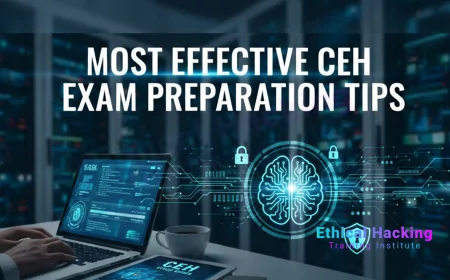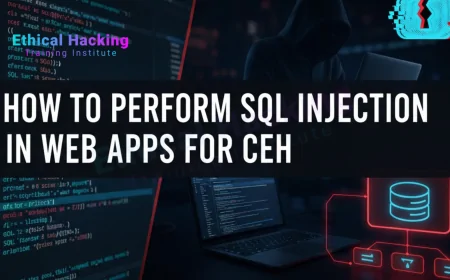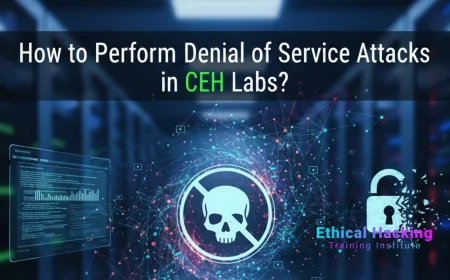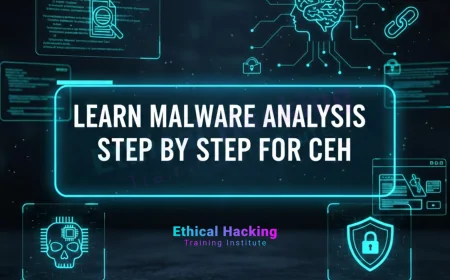CHFI Course: Everything You Need to Know Before Enrolling | Complete CHFI Course Overview: Read This Before You Enroll
Explore everything you need to know about the CHFI course before enrolling—curriculum, labs, tools, exam details, costs, and career paths.
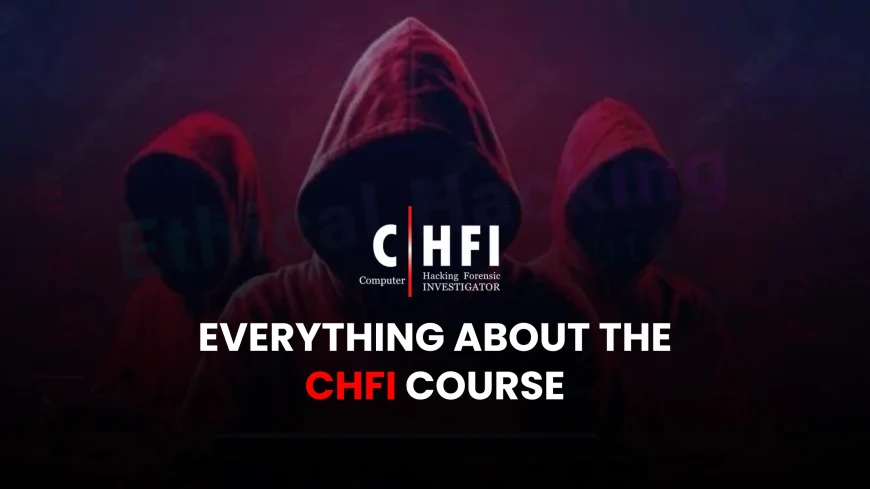
Table of Contents
- Course Overview
- Who Should Take It?
- Prerequisites
- Training Formats
- Course Curriculum
- Hands-On Labs
- Forensic Tools
- Duration & Cost
- Exam Details
- How to Prepare
- Benefits & ROI
- Course Comparison
- Career Opportunities
- Post-Course Support
- Reviews & Reviews
- Tips Before Enrolling
- Common Challenges
- Choosing Providers
- Future Scope
- FAQs
- Conclusion
Course Overview
The CHFI (Computer Hacking Forensic Investigator) course is a globally recognized program developed by the EC-Council to train professionals in detecting hacking attempts, gathering legally admissible digital evidence, and conducting thorough forensic investigations.
This course bridges cybersecurity, law enforcement, and legal compliance, offering students the skills needed to operate in modern digital crime scenes.
What Is the CHFI Course?
The CHFI course teaches students how to:
-
Identify traces of cyber intrusions
-
Preserve and analyze digital evidence
-
Understand legal requirements and forensic standards
-
Recover data from various digital devices and storage media
-
Prepare forensic reports suitable for court testimony
Key Learning Objectives
By the end of the course, learners will be able to:
-
Master forensic methodologies and investigation techniques
-
Work with tools like FTK, EnCase, Volatility, and Autopsy
-
Analyze Windows, Linux, cloud, mobile, and network environments
-
Perform disk imaging, file carving, memory dumps, and evidence reconstruction
-
Understand how to present findings for legal purposes
CHFI Course Modules (Sample Breakdown)
The CHFI program is typically divided into 14–16 modules, including:
| Module | Topic |
|---|---|
| 01 | Computer Forensics in Today’s World |
| 02 | Investigating Cyber Crimes |
| 03 | Understanding Digital Evidence |
| 04 | Forensics Investigation Process |
| 05 | Disk Forensics |
| 06 | Operating System Forensics (Windows/Linux) |
| 07 | Network Forensics |
| 08 | Cloud and Email Investigations |
| 09 | Mobile Device Forensics |
| 10 | Malware and Memory Forensics |
| 11 | IoT & Dark Web Forensics |
| 12 | Database Forensics |
| 13 | Report Writing and Presentation |
| 14 | Legal Compliance & Expert Testimony |
(Note: Some providers may merge or expand modules.)
Tools You’ll Work With
A few of the forensic tools covered in labs and coursework include:
-
FTK Imager
-
Autopsy & Sleuth Kit
-
Volatility Framework
-
Wireshark
-
X-Ways Forensics
-
EnCase
-
Oxygen Forensic Detective
-
Cellebrite UFED
What’s Included in the Course?
Most CHFI training providers offer:
-
Instructor-led or online training access
-
Virtual lab environments (iLabs by EC-Council)
-
Study guides and official eBooks
-
Exam voucher for CHFI certification exam
-
Practice quizzes and mock exams
-
Post-course support and resume guidance
Delivery Formats
You can take the CHFI course in multiple modes:
-
Live online classes
-
Self-paced video courses
-
In-person bootcamps (5 to 7 days)
-
Corporate/onsite training for teams
Course Duration
-
Fast-track bootcamp: 5–7 days (intensive)
-
Online/self-paced: 4 to 12 weeks
-
Corporate batch: Flexible timing based on need
Typical Pricing
-
India: ₹80,000 – ₹1,50,000
-
International: $1,800 – $3,500 USD
Pricing varies based on provider, location, support, and lab access.
Certification Outcome
Upon completion and passing the exam, you’ll receive:
-
The CHFI v10 (or latest) certification
-
A globally recognized credential backed by EC-Council
-
Eligibility to join DFIR (Digital Forensics & Incident Response) teams globally
Summary
The CHFI course is ideal for those looking to specialize in cybercrime investigation, digital forensics, and legal evidence handling. Whether you're from an IT, security, or law enforcement background, CHFI equips you with skills that are both in-demand and future-ready.
Who Should Take It?
- IT professionals & sysadmins
- Security analysts & incident responders
- Law enforcement investigators
- Students & career-switchers interested in cyber-forensics
Prerequisites
- Basic knowledge of operating systems and networks
- Familiarity with command-line tools
- Experience in security roles recommended but not mandatory
Training Formats
- Self-paced online modules
- Live instructor-led virtual classes
- Intensive bootcamp (on-site or virtual)
- Corporate/group training
Course Curriculum
- Digital forensic fundamentals
- Chain of custody & documentation
- Windows, Linux & mobile forensics
- Memory, malware & network forensics
- Cloud/IoT investigation techniques
- Evidence analysis & reporting
Hands-On Labs
Virtual labs include:
- Disk imaging with write-blockers
- Registry and memory analysis (Volatility)
- File carving and deleted data recovery
- Network packet analysis and timeline reconstruction
Forensic Tools
- EnCase, FTK, X-Ways, Autopsy
- Volatility, Cellebrite, Wireshark
- Mobile tools: UFED, Oxygen Forensic
Course Duration & Cost
Typical durations:
- Bootcamp: 5–7 days
- Online: 6–12 weeks
- Cost: ₹80k–150k (IN); $2k–4k USD internationally
Exam Details
- 150 MCQs, 4 hours
- Passing score ~70%
- Exam voucher usually included
How to Prepare
- Create a weekly study & lab schedule
- Practice on real forensic challenges
- Use mock exams and flashcards
- Join study groups and forums
Benefits & ROI
- Enhances forensic and cybersecurity credibility
- Boosts employability & salary (+25–40%)
- Provides access to niche roles in DFIR
Course Comparison
| Format | Duration | Cost | Best For |
|---|---|---|---|
| Bootcamp | 5–7 days | High | Fast track |
| Live online | 8–12 weeks | Medium | Flexible paced learning |
| Self-paced | Up to 6 months | Low | Budget learners |
Career Opportunities
- Forensic analyst
- Incident responder
- Malware investigator
- Law enforcement specialist
- eDiscovery consultant
Post-Course Support
- Resume/CV assistance
- Interview and lab refresher sessions
- Access to alumni forums
- Certification renewal support
Reviews & Testimonials
“Lab-based learning was extremely valuable.” – Ravi, Pune
“I transitioned from sysadmin to forensic analyst within months.” – Sara, Delhi
Tips Before Enrolling
- Review provider pass rate and lab quality
- Check included tools and exam voucher
- Clarify post-cert support and retake policies
Common Challenges
- Tool complexity—start simple first
- Balancing theory with lab time
- Study burnout—maintain routine breaks
Choosing a Training Provider
- Ensure EC‑Council authorization
- Look for experienced instructors
- Prefer providers with realistic labs
- Compare costs, support, and reviews
Future Scope
The future scope of CHFI certification is both promising and expansive, given the continuous growth of cyber threats and the global push for digital security. As cybercrime grows more sophisticated, so does the demand for professionals capable of investigating, analyzing, and mitigating digital incidents.
Here’s an in-depth look at the future opportunities, industry demand, and evolving roles for CHFI-certified professionals:
1. Increasing Demand for Cybercrime Investigation
-
Cybercrimes such as ransomware, phishing, data theft, and insider threats are becoming common.
-
Organizations, governments, and law enforcement agencies urgently need trained forensic investigators to trace and prosecute digital crimes.
-
CHFI-certified individuals are often hired by cybersecurity firms, CERTs, defense contractors, law enforcement, and intelligence agencies.
2. Growing Relevance in Legal and Compliance Sectors
-
Forensic professionals are key in e-discovery, evidence preservation, and digital testimony.
-
CHFI certification aligns with legal frameworks like:
-
GDPR (Europe)
-
IT Act (India)
-
HIPAA (US healthcare)
-
PCI-DSS (financial compliance)
-
-
Professionals with CHFI skills will be critical in regulatory audits, digital investigations, and court proceedings.
3. Integration with AI and Automation
-
The future of forensic investigations includes AI-powered forensic tools for automating:
-
Data carving
-
Log correlation
-
Threat mapping
-
-
CHFI holders who upskill with AI/ML knowledge will be in high demand for next-gen cyber forensic platforms and tools.
4. Cloud & Mobile Forensics Growth
-
As data shifts to the cloud, CHFI-certified professionals will increasingly:
-
Investigate multi-tenant cloud platforms
-
Handle mobile devices, IoT endpoints, and edge computing evidence
-
-
EC-Council’s CHFI curriculum is expanding to cover cloud forensic methodologies, making it future-proof.
5. Expanding Career Opportunities
With CHFI, you can explore specialized job roles like:
-
Digital Forensic Examiner
-
Cybercrime Analyst
-
eDiscovery Consultant
-
Incident Response Manager
-
Forensic Auditor
-
Threat Intelligence Analyst
-
Malware Analyst
These roles are in demand across:
-
Government and law enforcement agencies
-
Banks and financial institutions
-
Healthcare, defense, and telecom sectors
-
MNCs and cybersecurity consultancies
6. CHFI + Advanced Certifications = Career Acceleration
Combine CHFI with these for long-term growth:
-
CEH (Certified Ethical Hacker) – offensive knowledge
-
GCFA (GIAC Certified Forensic Analyst) – advanced forensics
-
CISSP / CISA / OSCP – enterprise security or penetration testing
-
Cloud security certs – AWS/Azure forensics focus
7. Global Talent Shortage = Job Security
-
According to (ISC)² and EC-Council reports, millions of cybersecurity roles remain unfilled globally.
-
The forensic domain has fewer specialists than other cybersecurity branches—making CHFI holders rare and highly valued.
8. Freelancing, Consulting, and Entrepreneurial Roles
-
Many CHFI-certified professionals become private investigators, consultants for law firms, or start digital forensic consultancies.
-
With the right toolkit and experience, you can offer services across borders, especially for mobile forensics and ransomware investigations.
Final Thought:
The CHFI certification is not just a current credential—it's a long-term career enabler. As cybercrime techniques evolve, certified forensic investigators will be vital defenders of digital truth.
Frequently Asked Questions
1. What is CHFI?
Computer Hacking Forensic Investigator—an EC‑Council certification.
2. Who can take CHFI?
IT pros, security analysts, law enforcement, students.
3. Any prerequisites?
Basic IT knowledge recommended.
4. How long is a CHFI course?
Bootcamp:7 days; online:6–12 weeks.
5. Cost?
₹80k–150k in India; $2k–4k USD globally.
6. Lab access?
Yes—should be included for hands-on practice.
7. Tools used?
EnCase, FTK, Autopsy, Volatility, Cellebrite.
8. Exam format?
150 MCQs, 4 hours, pass ~70%.
9. Is exam voucher included?
Usually—confirm before enrolling.
10. Can I attend online?
Yes—live virtual or self-paced.
11. Renewal required?
Yes, every 3 years via CPE credits.
12. Job roles after CHFI?
Forensic analyst, incident responder, eDiscovery consultant.
13. Salary range?
₹6–15 LPA (India), $70K–120K global.
14. Self-paced vs bootcamp?
Bootcamp = fast track; online = flexible.
15. Are legal topics covered?
Yes—chain of custody, documentation, court presentation.
16. Do I get certificates?
You receive CHFI certification after passing exam.
17. Is job support provided?
Yes—resume help, interview prep, community access.
18. Can CHFI holders testify in court?
Yes, trained in courtroom presentation.
19. Any advanced certs?
Yes—GCFA, CFCE, OSCE for advanced forensic specialization.
20. How to choose provider?
Check labs, instructors, pass rates, support, cost.
Conclusion
Enrolling in a CHFI course equips you with forensic skills, legal knowledge, and career opportunities in cybersecurity. Research formats, labs, and support to choose a program aligned with your goals.
What's Your Reaction?
 Like
0
Like
0
 Dislike
0
Dislike
0
 Love
0
Love
0
 Funny
0
Funny
0
 Angry
0
Angry
0
 Sad
0
Sad
0
 Wow
0
Wow
0






